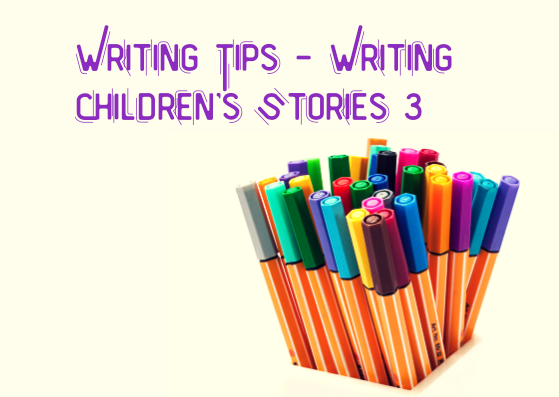
Hello everyone, here’s another round of writing tips for those of us who find writing stories for children a challenge. You can find the first two parts in this series here and here.
Get Right to the Action
Children aren’t interested in long descriptive scenes. They like things to be happening near enough all the time. Too long of a lull in the action, or an extended break to describe the magical castle in minute detail, and your reader will switch off. Children just want to know that the castle is magical, they’re not too concerned with how it came to be that way and they really only care what it looks like in a basic sense. This is especially true of younger children. Older children can cope with a little more detail.
Get to the Point
Children prefer it when you ‘tell it like it is’. They don’t require or necessarily want long, rambling explanations about what’s happening or even why it’s happening. They like things to be pretty much straightforward.
Create exciting and Relatable Characters with Flaws
Don’t let your protagonist be a flat, cardboard cut-out who gets everything right all the time. Your readers want to connect with the character and relate to them, finding things in them that they also see in themselves. Children are never well behaved at all times, and so they would never be able to relate to a perfect, goodie-goodie of a character with absolutely no flaws.
Minimise Pop Culture References
Referencing something in your story that is at the height of popularity today may alienate future readers. Remember, there will always be children and, with any luck, your book will always be available for them to read. The chances are that what is popular when you write your book, won’t be when it’s been around for a few years.
Have Fun
We all know that writing is hard work and it can be especially hard to write for children, but if you don’t enjoy writing your story, then it will more than likely show in your work and your young readers won’t enjoy it either. If you’re finding your story dull or boring to write, then try to work out why, and then find a solution. Maybe you need more conflict, or maybe your main character needs to be a little more rounded out. When you’re thrilled with your work, then your readers will be too.
As always, thanks for reading my words, your time means a lot to me!
Until next time,
George
© 2018 GLT
Categories: Writing Tips

Nice points! I’ve long held the opinion that children’s stories inherently trump “adult’s stories” in importance, if for no other reason than that they catch the kids first, in a time when they are still less formatted than we. (On average.) Say, have you written any children’s stories of your own?
LikeLiked by 1 person
Hi Alice, I’ve tried writing children’s stories but they always turn out either a little younger than intended, or a little older. That’s why I have those tips, I feel like I’ve spent forever trying to understand where I’m going wrong 😁 I’d like to try again when I’ve more time though. I agree, children’s stories are more important than ‘grown up stories’ because if they read great stories when they’re young they’ll be more like to keep reading as they get older.
LikeLike
Is that necessarily a bad thing, though, if the stories turn out good and readable otherwise? I mean, a shovel is a great tool, even if you were trying to build an ax.
LikeLiked by 1 person
Excellent way to put it, Alice! 😁
LikeLiked by 1 person
So helpful for a new writer like myself:)
LikeLiked by 1 person
Thanks! I’m glad you’re finding them useful 🙂
LikeLiked by 1 person